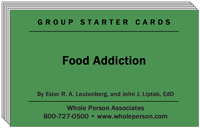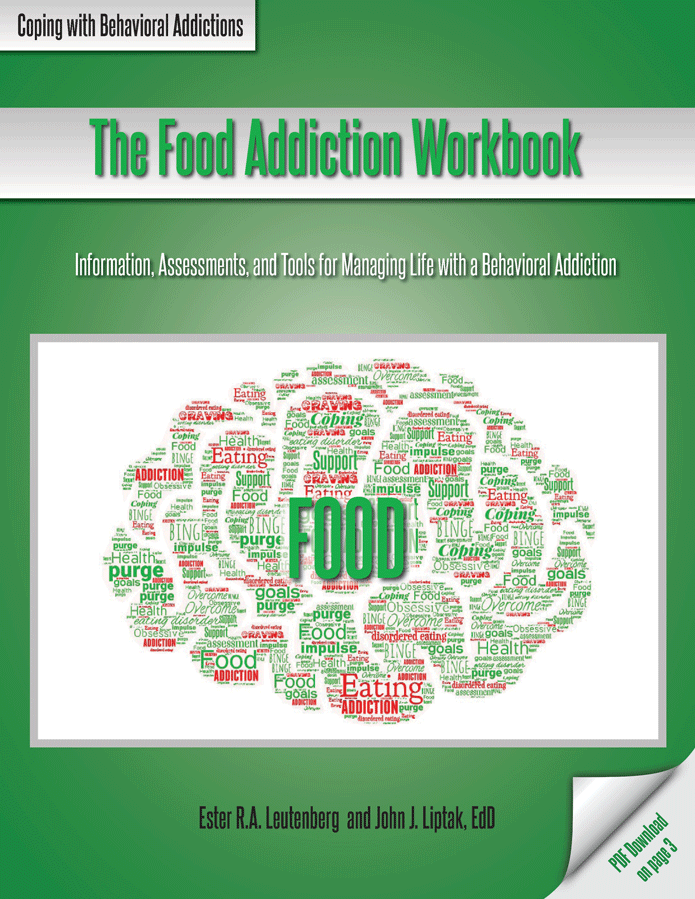Food Addiction
The Food Addiction Workbook provides helping professionals with cognitive and behavioral assessments, tools, and exercises to treat the root psychological causes of food addiction. It is designed to help people identify and change negative, unhealthy thoughts and behaviors that may have led to food addiction. The activities in this workbook can assist participants in identifying the triggers that can lead to food addiction and teach them ways to overcome and manage those triggers.
The Food Addiction Workbook will help participants to help themselves in these ways:
- Recognize that they are experiencing an addiction problem.
- Reflect and become aware of the behaviors that were part of, and arose from, the addiction.
- Build self-esteem in positive capabilities outside of eating.
- Understand the triggers for preoccupation with various aspects of eating behavior.
- Develop greater self-acceptance and the ability to change ineffective behaviors.
- Understand recurring patterns that indicate an addiction to food.
- Learn ways to live a new life without the need to obsess about eating food.
The Food Addiction Workbook is a practical tool for teachers, counselors, and helping professionals working with people affected by an addiction to food. Depending on the role of the person using this workbook and the specific group’s or individual’s needs, the modules can be used individually or as part of an integrated curriculum. Facilitators can use an individual activity with a group or many activities over a multi-day workshop.
With the development of the Yale Food Addiction Scale (Gearhardt, Corbin, and Brownell, 2009) enough research is being conducted for Food Addiction to be included in the next updated version of the DSM. According to the YFAS, the most common food addiction symptoms as assessed with the YFAS include the following:
- A persistent desire or unsuccessful efforts to cut down or control eating.
- Continued eating despite physical or psychological problems and tolerance.
- Consumption of large amounts.
- Consumption over a longer period than intended.
- Spending much time obtaining food, eating, or recovering from a food’s effects.
- Giving up important activities.
- Withdrawal symptoms when attempting to cut down.
This workbook contains five modules of activity-based handouts that will help participants learn more about themselves and their food addiction. These modules serve as avenues for self-reflection and group experiences revolving around topics of importance in the participants' lives. The activities in this workbook are user-friendly and varied to provide a comprehensive way of analyzing, strengthening, and developing characteristics, skills, and attitudes for overcoming an addiction to food.
The activities in this workbook are reproducible. Minor modifications are permitted to suit participants. Copyright is retained by the authors and must be included on reproduced materials.
Food Addiction Modules
Module 1: Dealing With Cravings
This module helps participants investigate their eating behaviors and cravings. The module explores why people have cravings, ways to distract themselves from these cravings, healthy substitutes for cravings, and the long-term consequences of binge eating.
Module 2: Emotional Eating
This module helps participants to explore why they turn to food when they are feeling a variety of emotions: understand their eating schedule, identify eating triggers, learn effective ways of coping without eating, and learn how to be more mindful while eating.
Module 3: Consequences of a Food Addiction
This module helps participants examine the consequences of problem eating behavior, the physical consequences of poor eating habits, their eating behaviors and how they can affect self-esteem, and how people addicted to food attempt to isolate themselves socially from family and friends.
Module 4: Healthy Routines
This module helps participants be more mindful of their eating behaviors, rely on exercise to help curb eating behaviors, enhance good sleep behaviors, use physical activity to think less about eating, set goals for effective eating behaviors, and avoid junk food.
Module 5: Coping Strategies
This module helps participants discover ways to cope with their addiction to food by planning healthy ways of shopping for groceries, exploring how they see themselves when they look in the mirror, and identifying people to whom they compare themselves.
PDF Worksheets - With the purchase of this workbook, you also get access to a PDF download of the included worksheets.
 Food Addiction Card Deck
Food Addiction Card Deck
Using the Discussion Starter Card Deck will break the ice, encourage openness, and help introduce a specific subject. Activity handouts included in these workbooks are reflective, easy-to-use exercises, presented in a variety of formats to accommodate multiple intelligences and different learning styles. Each question corresponds to a page in the workbook.



